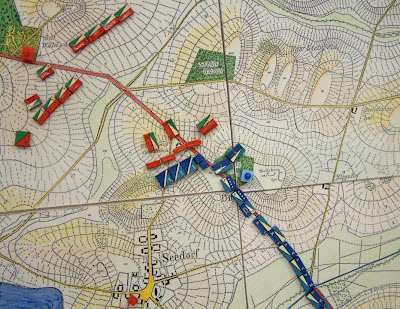Business Wargames at Poppyfish
 |
| Running wargames for business is not about playing soldiers |
As an Organisational Development Consultant I view wargaming as one of many possible interventions that I can offer to clients to allow them to challenge their own thinking and as a space for personal development and the spotlighting of talent. For organisations we approach them as ways of building evidence of a spirit in support of resilience – that ability to maintain a dynamically stable state under continuous stress. Negotiation scenarios can be a subject for exercise, although critical incidents such as cyber threats, PR crisis, continuity incidents, strategic planning horizons and PR crises are more popular, and often higher profile, areas for our clients.
Whole system approach
Organisations exist as whole systems experienced by people, so from our OD perspective we like to look at the human influences and impacts of the scenario. Because of this, we do not tend to use software to number crunch as we go through the exercise, but are much more interested in what is going on for the people involved. For instance, during or after the game we discuss individuals own values, how they stand alongside the stated organisational values and how that can affect the development of the scenario or relationship, how people engage in 'fantasy' about other groups or teams and how that can play out plus and a whole host of other process ‘stuff’ that goes on for people in these types of situations. People can see this play out in a wargame in a fashion that isn’t always obvious in other parts of their working life. I am not a great fan of using computer models to dictate outcomes, ie the "you hit the magic profit ceiling therefore you win" kind of games are not my cup of tea, but I accept absolutely that they can add value in assessing probabilities of certain outcomes, so we can build in aspects of this if the client sees them as important drivers of behaviour. All of our wargaming interventions are bespoke designs for the client. I can't see how they could be done any other way.
The Poppyfish model (left) is Listen (Consult), Design, Deliver, Feedback & Analysis, and Follow Up (see earlier blog post). Typically the wargame builds from other ongoing work with the client – it being very hard to sell wargames cold. Some organisational cultures are sensitive about the use of the phrase 'wargame', as it can have some frivolous or childish connotations. But once a broad scope has been agreed, we will work with a client to discuss the possible challenges they may face in their business, like a negotiation for instance, and construct a phased wargame, red team exercise or decision making intervention around that, drawing on the various stakeholders. Listening is the top skill here. Understanding the needs and challenges is the most important part of good design. We then lock ourselves away, brainstorming ideas until a scenario begins to present itself. I like to have a champion in the client organisation to work to, and we can include them in our design team then even better – they can be excellent at helping to ensure the right people are involved on the day(s), and in selecting the best people to play the ‘red team’ if that’s appropriate. If possible, we will then trial the exercise, but in the end the links between cause and effect can become so complex that no wargame runs as a carbon copy of the trial run, so we work on the sound principle that we must be prepared to go where the event takes us. This provides great learning opportunities for the facilitators too!
Coming at it this way you won’t be surprised to know that our exercises are usually run as a series of nodal decision making points where the participants are provided with reports of events and outcomes from previous phases and must then deal with the issues that each of these creates. This is not a role play situation – participants take part as themselves, reacting in a way appropriate to their current role. Facilitators earn their crust by keeping the whole thing on track and to schedule and leading the debrief.
Finally, follow-up is a crucial and, we think, non-negotiable aspect of the learning that events such as these stimulate. Contracting this into the deliverable from early on helps to ensure that the learning is applied and revisited.





Comments
Post a Comment